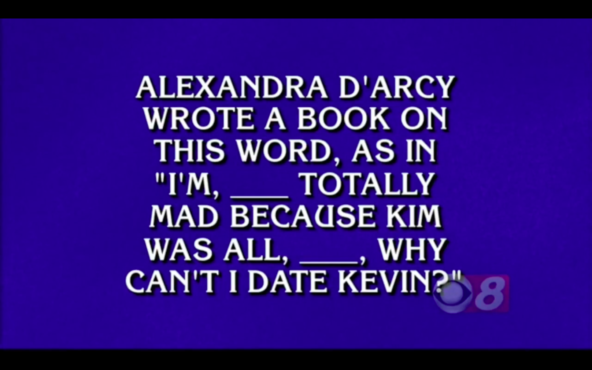
”Linguistics, 1200,” says the Jeopardy contestant on the March 26, 2018 edition of the show. Alex Trebek, doing his best (see: worst) Valley Girl accent, reads the clue:
“Alexandra D’Arcy wrote a book on this word, as in ‘I’m ____ totally mad because Kim was all, ____, why can’t I date Kevin?’”
The contestant buzzes in. “What is ‘like?’”
“Like, yeah,” drawls Trebek. The contestant gets the $1200, and a few thousand miles away from the set, a UVic professor gets a dinner party anecdote to beat all dinner party anecdotes.
Alexandra D’Arcy, the reference in the Jeopardy clue, is a UVic professor in the Department of Linguistics. She found out about the TV shoutout when a friend posted a photo of the moment on her Facebook wall.
“I was pretty surprised, and also pretty confused. Out of context, it was hard to imagine that this was true,” D’Arcy wrote over email. “I immediately googled that day’s show, found it already up on YouTube, and watched. And there it was—the ‘Alexandra D’Arcy’ question. And of course, shortly after that my (Facebook) and Twitter feeds exploded with activity. Word travelled fast.”
This isn’t the first time D’Arcy’s book, titled Eight Hundred Years of Like, has received attention. Just one year ago, in February 2017, the CBC wrote a story about it.
“And the ‘like’ might seem random, but it has a job to do,” the article said.
“Think of it like a road sign in a conversation,” D’Arcy told the CBC. “This is how what I’m about to say links to what I just said.”
Her book, she says, discusses the word “like,” and how its origin can be traced back to the year 1200.
“I was pretty hesitant to work on ‘like’, however, because it’s a fairly widely reviled feature of English and it’s ideologically associated with a certain kind of person (typically, vapid young women),” D’Arcy said. “None of that ideology is true, as it happens.”
It may seem like a fluffy topic for a book, but it’s exactly that perception that spurred D’Arcy to do her research.
“What convinced me to work on ‘like’ initially was a remark by a senior scholar in my department at the time, who basically said that ‘like’ was a waste of time because ‘everyone knows it can go anywhere.’ That really upset me,” wrote D’Arcy. “At the foundation of language variation and change is the idea of ‘structured heterogeneity’—the idea that variation in language is structured and constrained, not random. So I had to do the work. I had to show that ‘like’ isn’t random, that it’s systematic.”
It’s part of a larger approach to language transformation.
“When we notice change happening now, we typically take the stance that the language is falling apart around us,” she said. “The truth is, English has never stood still. No living language does. Incredible!”
It’s certainly incredible for the contestant who won $1 200. But despite D’Arcy’s newfound Jeopardy fame, she has no plans to compete on the show herself.
“No way!” she writes when I ask. “My expertise is too concentrated. I’d get creamed if I tried to be a contestant.”
Thanks for reading! If you enjoyed this article and would like to make sure we keep writing articles like it, please consider supporting us on the Martlet 70 fundraiser’s GoFundMe page.
If you hated the article, though, you should still donate to the GoFundMe page (so we can hire better writers).






